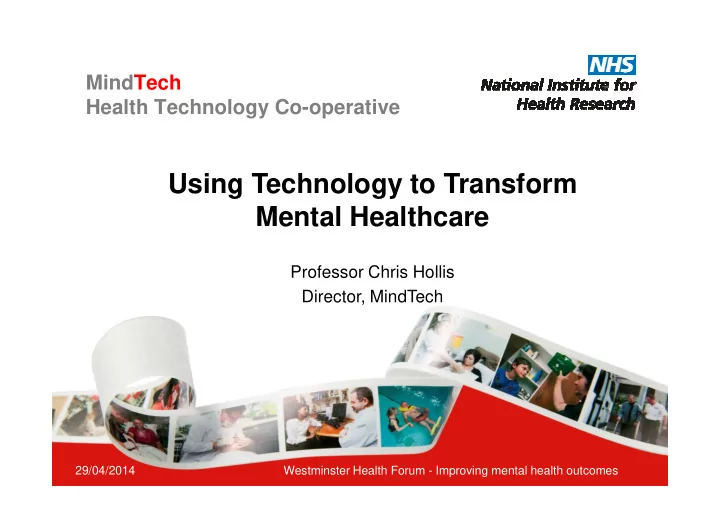

MindTech Health Technology Co-operative Using Technology to Transform Mental Healthcare Professor Chris Hollis Director, MindTech 29/04/2014 Westminster Health Forum - Improving mental health outcomes
NIHR Healthcare Technology Co-operatives (HTCs) Bradford: Wound Prevention & Treatment Leeds: Colorectal Therapies Sheffield: Devices for Dignity Sheffield: Devices for Dignity Nottingham: Mental Health Cambridge: Brain Injury Birmingham: Trauma Management Barts: Gastrointestinal Disease Guys: Cardiovascular Disease From January 2013
MindTech Aims • To act as a catalyst for the development, evaluation and adoption of innovative technologies in mental healthcare • To bring together patients and patient groups, • To bring together patients and patient groups, clinicians, mental health charities, industry/SMEs and academia • To help transform service delivery, enhance patient experience and improve clinical outcomes 3
Why Mental Health? • Mental health problems affect 1 in 4 people • Huge economic cost to UK - £105bn per year • Greatest cause of health related disability in UK • High unmet need with little technological innovation • Subjective clinical assessment dominates practice • Lack of historical engagement with SMEs
Why Technology? • £30bn NHS funding gap by 2020 requires transformational change • Demand for more flexible, person-centred care and self- management management • Advances in computer science and bio-engineering • Rapid growth in smart technologies • Britain is ready for digital mental health
MindTech Innovation Partnerships Users SMEs & Developers Patients, clinicians, NHS Trusts, charities & the public MindTech MindTech Tourettes Action University Research Funding, Policy, Regulation & Behavioural Science, Psychiatry, Computer Science, Human Factors, Governance Clinical Trials, Bio-engineering 7
MindTech Approach Identify the clinical problem/ unmet need Develop/ identify a technological solution User perspectives Evaluate clinical/cost effectiveness Adopt and disseminate in NHS
On-line therapy Apps Automated objective E-mental health Activity, mood & Apps, SMS text behavioural cognition messaging analysis • Objective assessment • Real-time monitoring Personalised Big data & • • Early relapse Early relapse ambient ambient machine machine • Widening access monitoring (PAM) learning detection • Increasing adherence • Self-management Serious Neuromodulation rTMS, tDCS, Games Avatar therapy VNS Virtual reality The Mental Health Technology Landscape
Mental Health Apps • My Journey App – Early Intervention in Psychosis Service for 14 - 35 year olds. Surrey & Borders Partnership NHSFT Graded self-assessment, mood management tips, emergency contacts, information • • Actissist – personalised CBT treatment for early Actissist – personalised CBT treatment for early stage psychosis. University of Manchester • Doc Ready & QDoc – checklist for patient/GP communication. Social Spider and others. • CANTABmobile – Mobile app for memory assessment using Paired Associates Learning test. Cambridge Cognition Ltd. 10
My Journey EIP App Reminders Contacts Information Sarah Amani 11
My Journey EIP App Mood self- Pill tracker monitoring supports adherence 12
QbTest: Objective Assessment of ADHD • Computerised assessment of attention and activity • Supports clinical decision making • Provides patients with objective reports on their condition 13
Automated objective behavioural analysis: mood and depression Valstar et al. (technology theme)
Remote / Video Therapy Applicable to multiple conditions: • Depression • Anxiety • Self-harm • Tourette’s • Eating Disorders, etc On-line therapies via text, voice, video On-line therapies via text, voice, video • • Real-time and asynchronous • 24/7 access • Evidence-based content/ CBT therapy • High reported user satisfaction & improvement • But few independent evaluations…… • Research evidence for cost-effectiveness still needed • Potential platform for NHS clinicians •
The Digital Health Explosion • 2010: 5,000 health apps available • 2013: Global m-Health market worth £2bn • 2014: 97,000 mobile health apps in 62 app stores • 2017: Global m-Health market worth £20bn • Where’s the research evidence? Safety? Efficacy?
Key Challenges • Earlier user involvement in design and development • Grow the research evidence-base for user acceptability, improved mental health outcomes and cost effectiveness • Regulation, industry standards and quality control for mHealth apps • Scalability and implementation: from local to national • Privacy, trust, consent and data security • Interoperability – connectivity of apps and m-health with NHS N3, EPR, clinician decision support systems • Collaboration across the NHS, industry and academia 17
MindTech Contacts: Director Prof Chris Hollis chris.hollis@nottingham.ac.uk Technology Lead Prof John Crowe john.crowe@nottingham.ac.uk Programme Manager Dr Jen Martin Jennifer.martin@nottingham.ac.uk 18
Recommend
More recommend